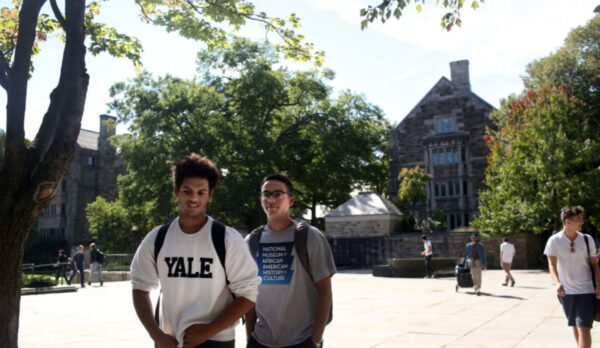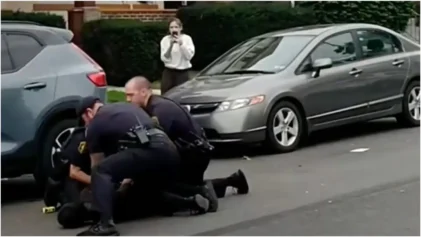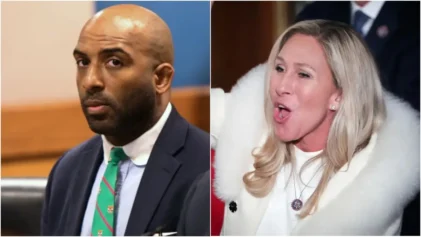Yale University will now provide financial assistance to students graduating from a local Connecticut high school to attend any historically Black colleges or universities of their choosing.
The award is a part of an initiative started over the last few years, which aims to provide a form of reparation to Black people for the institution’s participation in American slavery.
Recipients of the scholarship will have to go to school out of state, as there are no HBCUs in The Constitution State.

The university announced the launch of The Pennington Fellowship on Dec. 12. The fund was created to support New Haven public school students desiring to attend one of the 107 colleges designated as HBCUs. The Pennington Fellowship will be a competitive scholarship and, over the course of four years, will support 10 to 12 students in each college-bound cohort, according to President Peter Salovey.
“When fully implemented, about forty to fifty students will receive Pennington scholarships at any given time,” the president said.
The scholarship criterion requires seniors attending any “New Haven public high school, submit an essay, provide a letter of recommendation, and have participated in at least forty hours of community service.”
Should a student receive the scholarship and complete the four-year program in a Black college, Yale would be responsible for $80,000 in tuition and fees for the fellow.
“This scholarship addresses, in part, historical disparities in educational opportunities for Black citizens. It will be funded by Yale and administered by the New Haven Promise program, which the university co-founded in 2010 to put the dream of a college education within reach for young people in our home city who otherwise could not afford it,” Salovey wrote in a statement on the school’s website.
It also is another way for the school to grapple with discoveries that the university was intimately involved in perpetuating slavery.
The school acknowledged that “enslaved Africans’ labor was used in the mid-18th-century construction of Connecticut Hall, an iconic building in the heart of Old Campus,” and that in 1831, “prominent members of the Yale community joined with fellow New Haven leaders to stop a proposal to build a college for Black students in New Haven.”
Another shameful connection to the bigotry of slavery is the names of Confederate soldiers, politicians, and other Southern states stakeholders inscribed on the Rotunda of Memorial Hall, done after slavery and in the early part of the 20th century.
Most recently, in the 1920s and 1930s, Yale faculty members played leading roles in the American eugenics movement, including three scholars who served on the board of directors of the American Eugenics Society.
Salovey wrote that he believes, “The strength of institutions can be measured, in part, by their willingness to confront their past openly — and act meaningfully on what they find.”
The scholarship is named after the Rev. James W. C. Pennington, the first Black student to attend Yale.
According to ConnecticutHistory.com, Pennington, whose first name was James Pembroke, was enslaved at birth on the Eastern Shore of Maryland. In 1827, at 20, he ran away, hoping to find freedom up North.
His narrative reveals his journey was not easy, with him even being captured by slave hunters but being released because he told them he had a highly contagious disease, smallpox. However, he made it to Pennsylvania, connected with the Society of Friends, better known as the Quaker community, and went through the Underground Railroad.
The preacher lived as a fugitive for 24 years before being able to legally call himself a free man.
After living in New York and later Connecticut, Pennington desired to go to Yale Divinity School but was prohibited from formally enrolling because he was Black. However, he was not deterred from auditing classes at the seminary.
A minister, scholar and speaker, Pennington also became an abolitionist, counting as his friends William Lloyd Garrison, Simeon Jocelyn, Lewis Tappan and Frederick Douglass. In fact, in 1838, he married Douglass to his wife, Anna Murray.
“Despite living in a time when Black citizens were denied equality, James Pennington pursued education for himself and others throughout a life lived with extraordinary courage,” the Yale president remarked. “From 1828 to 1834, he hired teachers to tutor him in Greek and Latin and attended night school, all while working as a coachman in Brooklyn Heights and gaining prominence as a delegate at the first Colored Convention in Philadelphia. In 1849, he published a powerful autobiography, ‘The Fugitive Blacksmith.’”
According to the president, this will not be the first connection that Yale and various HBCUs have instituted, but it “builds on existing collaborations between Yale and HBCUs, including faculty-led research and teaching initiatives.”
Salovey wrote, “The Graduate School of Arts and Sciences has been engaging with HBCU students to increase their participation in the graduate school’s one-year post-baccalaureate research program. In addition, Yale is increasing the number of HBCU students who participate in the eight-week-long summer undergraduate research fellowship (SURF) program.”
“We trust that these experiences with Yale encourage HBCU students to continue their education here.”
Over the years, Yale has welcomed students from ten HBCUs through its partnership with the Leadership Alliance, a group of U.S. universities and private companies that support the development of students from historically Black and minority-serving institutions. Still, the president is hoping to do more.
The scholarship is merit-based and is open to any qualifying student regardless of race, The College Fix reports. It will also be administered by Yale’s New Haven Promise.
A spokesperson from New Haven Promise, Brett Hoover, said to the website, “Over the last 10 years, nearly 500 city students have expressed interest in attending a Historically Black College or University. It was the right time to make such an opportunity to allow students’ dreams [to] become a reality.”
When asked why would Yale fund students to attend schools other than one of the top schools in the country, Hoover explained this is not new for the Ivy League.
“Yale has been funding New Haven students to go to college through New Haven Promise since 2010 and is usually funding more than 700 students at any given time,” Hoover said. “Yale itself has a low acceptance rate (about 6%) and while the university admits between a dozen and two dozen New Haven public school students annually, the university makes the offer to help support city students in meeting their college dreams.”
In addition to the Pennington Fellowship, Yale will continue to offer funds for students to attend Yale.


